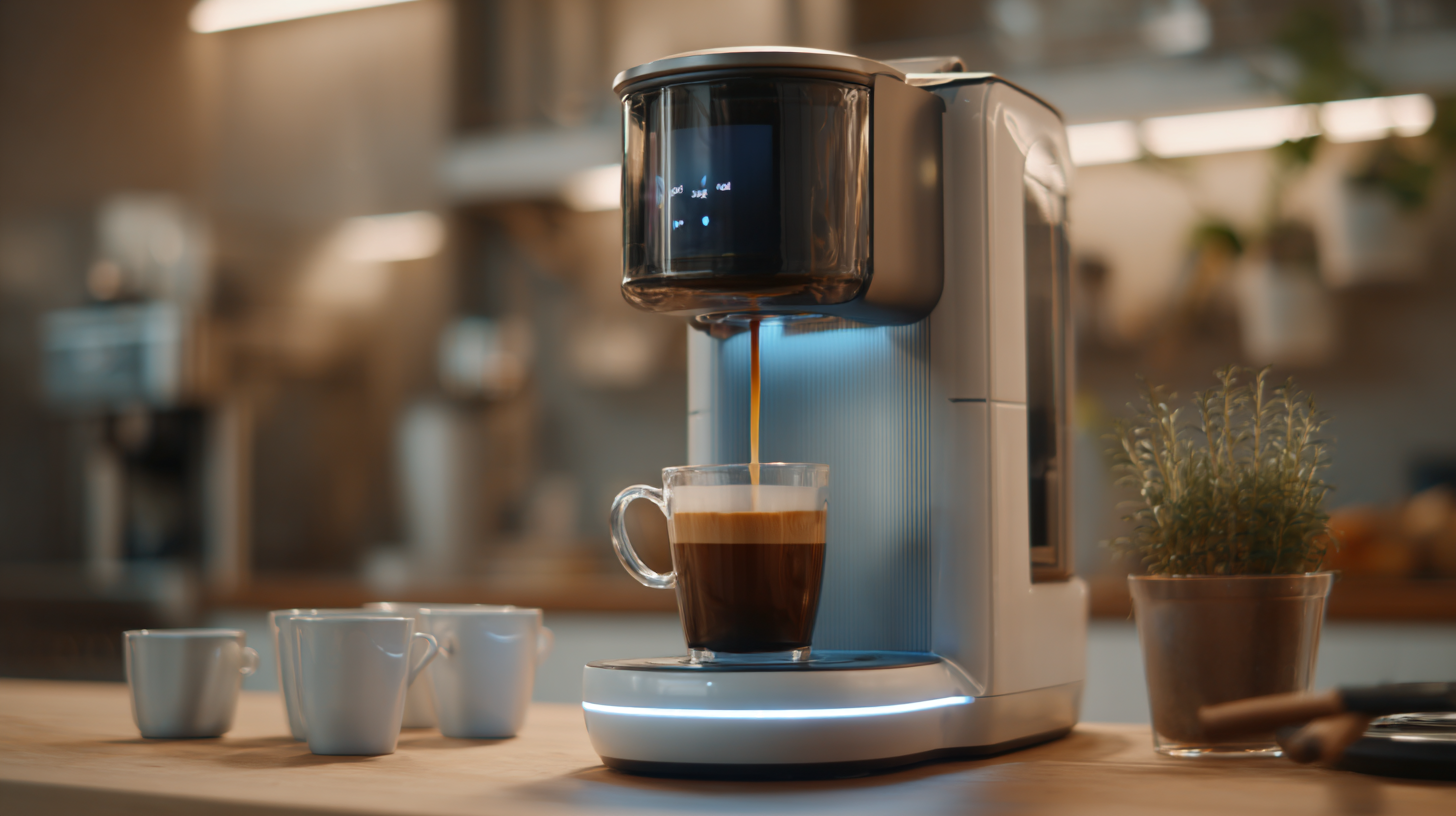In recent years, the coffee brewing landscape has witnessed a remarkable transformation, driven by advancements in artificial intelligence and automation. The rise of the "Coffee Robot" not only enhances the brewing experience at home but also elevates the standards of coffee quality. According to a market report by Statista, the smart coffee machine market is expected to reach $2 billion by 2025, reflecting a growing consumer demand for innovative brewing solutions. This trend underlines the shift towards convenience and precision in coffee preparation, as more enthusiasts seek to replicate café-quality beverages in the comfort of their homes.
Renowned coffee technology expert, Dr. Emily Brewster, states, "The Coffee Robot heralds a new era for home brewers, combining cutting-edge technology with traditional coffee-making techniques to unlock new flavors and consistency." This sentiment encapsulates the current excitement surrounding these devices, which harness machine learning algorithms to adapt and personalize brewing methods based on user preferences. As consumers embrace automation, the Coffee Robot exemplifies how technology can empower individuals to explore the art of coffee brewing while retaining the intricate nuances that define exceptional coffee.
By integrating AI technology into home brewing, the Coffee Robot is not just a tool, but a revolution that invites coffee lovers to experience the joy of crafting their perfect cup, while also benefiting from the insights derived from data analytics. The future of coffee has arrived, and it is reshaped by innovation and intelligence.

The coffee industry is witnessing a significant transformation as technology and tradition merge through the rise of coffee robots. According to a recent report by Allegra World Coffee Portal, the global coffee market is projected to reach over $450 billion by 2026, largely driven by increasing consumer demand for convenience and quality in home brewing. Coffee robots, equipped with advanced AI technology, are now able to replicate the art of brewing, allowing coffee enthusiasts to enjoy barista-quality beverages without leaving their kitchens.
These innovative machines not only serve consistently great coffee but also cater to individual preferences, adjusting parameters such as brew time, temperature, and even strength based on user inputs. A study by the Specialty Coffee Association shows that 82% of coffee drinkers believe convenience is a key factor in their coffee choices, highlighting the potential of coffee robots to tap into this growing trend.
**Tips for Using Coffee Robots:**
1. Experiment with different beans and grinds to discover new flavors that suit your palate.
2. Keep your machine clean and well-maintained to ensure optimal performance and taste quality.
3. Don’t be afraid to adjust the brewing parameters; small changes can make a significant difference in your cup quality.
This chart illustrates the increasing adoption of coffee robots in home brewing, demonstrating a shift towards technology-enhanced coffee preparation.
The integration of artificial intelligence in home brewing is truly setting a new standard for coffee enthusiasts. By harnessing sophisticated algorithms, modern coffee robots are not just brewing coffee; they are optimizing the brewing process based on individual preferences and environmental factors. AI technology evaluates various elements such as bean type, water temperature, and grind size to engineer the perfect cup tailored to each user’s taste. This level of precision and personalization transforms the coffee-making experience from a routine task into a bespoke ritual.
Furthermore, the adaptive capabilities of AI enable continuous learning from user feedback. As the system gathers data on what combinations yield the best taste for a specific individual, it refines its methods over time, ensuring that each brew surpasses the last. This dynamic approach mirrors trends seen in other sectors, such as pricing strategies in businesses where AI analyzes market conditions to optimize profit potentials. Just as businesses are leaning towards data-driven decisions to enhance their operations, the coffee robot exemplifies how AI can revolutionize home brewing, fostering a deeper connection between coffee lovers and their daily brews.

The Coffee Robot represents a significant leap forward in home brewing, particularly through its customizable features designed to cater to the unique tastes of every coffee lover. Users can adjust various settings, such as grind size, brew temperature, and extraction time, ensuring that each cup meets their personal preference. This level of customization allows enthusiasts to experiment with different coffee beans and brewing methods, resulting in a more personalized and satisfying coffee experience.
Moreover, the integration of artificial intelligence enhances the brewing process by learning from user interactions and preferences over time. The Coffee Robot becomes increasingly adept at predicting the optimal brew settings for individual users, streamlining the decision-making process. This intelligent adaptability not only improves flavor consistency but also encourages coffee lovers to explore new types of brews and flavors, transforming their home brewing rituals into a delightful journey of discovery. With its user-centric design and innovative technology, the Coffee Robot is indeed setting a new standard for coffee aficionados.
| Feature | Description | User Rating (1-5) | Customization Options |
|---|---|---|---|
| Brewing Strength | Adjust the intensity of your coffee from mild to strong. | 4.5 | Weak, Medium, Strong |
| Grind Size | Choose your preferred grind size for your coffee beans. | 4.2 | Fine, Medium, Coarse |
| Temperature Control | Set the brewing temperature for optimal extraction. | 4.7 | Low, Normal, High |
| Brew Time | Customize the brewing time for different coffee styles. | 4.3 | Short, Normal, Long |
| Smart Scheduling | Set your coffee to brew at a specific time. | 4.8 | Daily, Weekly |
The future of home brewing is increasingly shaped by the integration of smart appliances that prioritize sustainability without compromising on quality. According to a report by MarketsandMarkets, the smart kitchen appliance market is projected to reach $36.1 billion by 2024, reflecting a growing consumer inclination toward intelligent technologies in everyday cooking and brewing. This evolution is not merely about convenience; it also emphasizes responsible resource use. For instance, smart coffee machines equipped with AI can optimize energy consumption and reduce water waste, aligning with eco-friendly practices that resonate with today's environmentally-conscious consumers.
Tips: When investing in smart brewing appliances, look for models that offer programmable settings and energy-efficient modes. These features allow you to brew coffee precisely when you need it, avoiding unnecessary power usage during off-peak hours.
Moreover, the rise of AI technology in brewing enhances the personalization of each cup. Systems that learn your preferences can adjust grind size, brewing time, and water temperature to create your perfect brew consistently. A study from Technavio forecasts a 21% growth in demand for personalized smart coffee makers over the next five years. This presents an exciting opportunity for both coffee enthusiasts and casual drinkers to enjoy boutique-level coffee experience right in their kitchens.
Tip: Experiment with different brewing profiles offered by your smart appliance to discover unique flavor notes and improve your coffee palate over time. Adjusting variables like brew strength and extraction time can lead to delicious surprises with each cup.

The innovation of coffee robots represents a significant shift from traditional brewing methods, utilizing AI technology to enhance the overall brewing experience. Unlike conventional methods that often rely on manual input and the barista's skill, coffee robots are designed to automate the brewing process with precision. They analyze a multitude of factors such as water temperature, grind size, and brew time to consistently produce a perfect cup of coffee, ensuring that users enjoy a reliable outcome each time.
When comparing coffee robots to traditional brewing techniques, the key advantages of automation become apparent. Traditional brewing methods, while rich in artisanal value, can be subject to variability based on the brewer's experience and technique. In contrast, coffee robots eliminate this variability by adhering to precise algorithms developed from coffee science. This technological advancement not only caters to the need for consistency but also empowers users to customize their brewing parameters through intuitive interfaces. Ultimately, the rise of coffee robots signifies a blend of tradition and technology, appealing to both coffee enthusiasts and the casual drinker seeking convenience without sacrificing quality.
